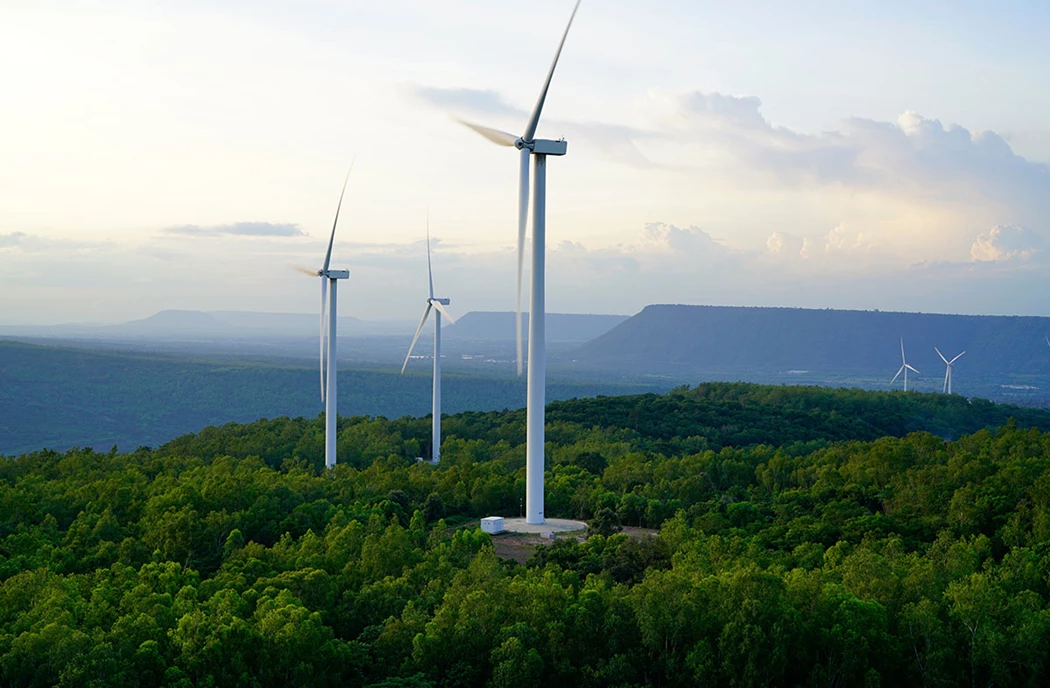Two Million People Are Demanding Payment for Forest Preservation
(Bloomberg) -- Right now, countries and companies can get paid for all kinds of pollution-reducing initiatives, including lowering historic rates of deforestation or planting new trees. But what about the places that have protected their forests from the beginning?
They too are entitled to compensation, argues Gabon, a heavily forested central African nation of 2 million people that’s become a leading advocate of payment for preservation.
Gabon and other countries will make their case again at the COP27 international climate summit that begins on Nov. 6 in Sharm-el-Sheikh, Egypt. At last year’s meeting, countries agreed on high-level rules to govern and implement an international carbon market but the precise details, including what activities can generate credits, are expected to be discussed in Egypt. Specifically, Gabon wants its forest conservation to generate carbon credits, because they absorb and store the gases that would otherwise contribute to global warming.
“They say ‘why should we pay you to let the forests do what the forest does naturally?’” said Akim Daouda, the chief executive officer of Gabon’s sovereign wealth fund, which will be marketing the country’s carbon credits. “But if the forest is there, it’s not by chance.”
Carbon credit markets currently take little account of standing forests, and Daouda and others say that leaves Gabon with few other options for economic development. Production of crude oil, which accounts for most of the country’s exports and government revenue, has slumped to about 200,000 barrels a day, down 45% from the mid-1990s. With a young, growing population and extreme inequality, the country is looking to its forest to generate jobs and income.
Logging, for now, is limited. The country’s forestry law requires companies to harvest just a few trees per hectare on a 25-year rotating basis. More than 10% of the country is in protected areas that ban cutting. At about 0.1% per year, deforestation levels are low, and Gabon is one of just 12 remaining countries considered “high forest, low deforestation,” according to the World Bank.
Gabon is looking to cash in on that record, and allowing existing forests to generate tradeable credits is one way to do it. The vehicle for this, says Lee White, the country’s environment minister, is “net sequestration credits” — compensation not for emissions reductions, but for absorption of existing emissions.
“We’re actually absorbing 100 million tons of carbon dioxide net out of the atmosphere every year,” White said in an interview.
White’s hopes are pinned on the new UN market. For them to be met, Gabon will need to convince other countries and a UN expert committee of the credibility of this new type of carbon credit.
The problem, from the carbon market perspective, is that Gabon’s forests have been absorbing carbon for centuries, long before anyone set a net zero goal or issued a carbon credit. That means the climate-cooling benefits they provide are already baked into the global goals for lowering emissions. Carbon credits, though, are designed to encourage additional carbon capture or emissions reductions — in part because companies buy them to offset their own emissions.
Read More:
- An African Forest Is on Front-line in Fighting Climate Change
- Gabon’s Climate Law Draws it Closer to Carbon Trade Ambition
- Gabon Carbon Credits Seen Fetching as Much as $35 a Ton
- World’s Biggest Carbon Credit Load Pits Firms Against Ministers
Even those who agree that countries deserve compensation for protecting their forests say carbon markets might not be the way to do it. “If each carbon credit is used to compensate for putting a ton of fossil fuel emissions into the atmosphere, then it becomes a trade-off,” said Donna Lee, a former US climate negotiator and co-founder of Colorado-based Calyx Global, which assesses the impact of carbon credits. “I don’t know that our carbon budget right now can manage that unless we are confident the transactions result in less, not more, greenhouse gases in the atmosphere.”
As negotiators iron out UN rules and countries decide what credits they’re willing to accept, Gabon is looking elsewhere. It plans to imminently issue 90 million forest-based credits to the voluntary carbon market in the first transaction of its kind. That market will also soon offer avenues for countries like Gabon to trade credits from simply hosting forests, rather than reducing emissions from deforestation or planting trees.
And last year Gabon became the first country in Africa to receive funds for protecting its forests from the Central African Forest Initiative, which is backed by a number of mostly European governments.
For Daouda, finding a way to reward highly forested countries such as his own is crucial: “We have two choices. Can we monetize [our forest] and keep it for the rest of the planet? Or do we need to find a way to respond to, to cater to the needs of our population?”
More stories like this are available on bloomberg.com
©2022 Bloomberg L.P.
KEEPING THE ENERGY INDUSTRY CONNECTED
Subscribe to our newsletter and get the best of Energy Connects directly to your inbox each week.
By subscribing, you agree to the processing of your personal data by dmg events as described in the Privacy Policy.
More renewables news

House Committee Says It Finds Evidence of ‘Climate Cartel’

WEC Energy Offered $2.5 Billion US Loan for Renewable Projects

With Trump Looming, Biden’s Green Bank Moves to Close Billions in Deals

GE Vernova Expects More Trouble for Struggling Offshore Wind Industry

Climate Tech Funds See Cash Pile Rise to $86 Billion as Investing Slows

GE Vernova to Power City-Sized Data Centers With Gas as AI Demand Soars

Longi Delays Solar Module Plant in China as Sector Struggles

Australia Picks BP, Neoen Projects in Biggest Renewables Tender

SSE Plans £22 Billion Investment to Bolster Scotland’s Grid
















